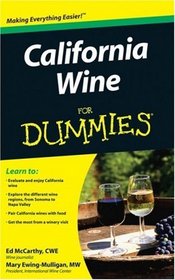Before reading this book, I had no idea that California produced so much of the wine enjoyed in the US. I also had no idea of the amount of wine they produced overall. The statistics mentioned at the beginning of the book were enlightening. I found out that almost 70 percent of the wine consumed in the US is from California. This book really opened my eyes to the amount and quality of wines from California.
The book contained many helpful features. The cheat sheet located in the front of the book was loaded with good information. One section that I found most helpful was the pronunciation guide. I was unfamiliar with some of the wines so this section should help me avoid embarrasing pronunciation errors when trying a new wine. Another
great feature was the inclusion of websites for locating availability and prices of wines. The definitions of regulated terms and explanations of unregulated terms and other information found on wine labels helps one to understand the language of wine labels.
After decoding the wine label, the authors include a short history of wine making in California. Descriptions were given of the major wine regions in California. They even include information about visiting California wineries, such as information on winery tours and local accomodations and restaurants. Descriptions of varietals
and listings of the author's recommended wines to try is another helpful feature.
McCarthy and Ewing-Mulligan explain everything clearly while not being condescending. I enjoyed reading this book and enjoyed putting my new knowledge to work the next time I bought wine. The authors credentials in the wine field gave me confidence in their writing. The authors also give websites for locating availability and prices of wines. Overall, I thought it was a fairly comprehensive first guide to California wines. It is quite a lot of information in one book and a great place to start for people that want to learn more about California wines.
I would recommend this book for anyone that is interested in learning more about California wines.
The book contained many helpful features. The cheat sheet located in the front of the book was loaded with good information. One section that I found most helpful was the pronunciation guide. I was unfamiliar with some of the wines so this section should help me avoid embarrasing pronunciation errors when trying a new wine. Another
great feature was the inclusion of websites for locating availability and prices of wines. The definitions of regulated terms and explanations of unregulated terms and other information found on wine labels helps one to understand the language of wine labels.
After decoding the wine label, the authors include a short history of wine making in California. Descriptions were given of the major wine regions in California. They even include information about visiting California wineries, such as information on winery tours and local accomodations and restaurants. Descriptions of varietals
and listings of the author's recommended wines to try is another helpful feature.
McCarthy and Ewing-Mulligan explain everything clearly while not being condescending. I enjoyed reading this book and enjoyed putting my new knowledge to work the next time I bought wine. The authors credentials in the wine field gave me confidence in their writing. The authors also give websites for locating availability and prices of wines. Overall, I thought it was a fairly comprehensive first guide to California wines. It is quite a lot of information in one book and a great place to start for people that want to learn more about California wines.
I would recommend this book for anyone that is interested in learning more about California wines.





